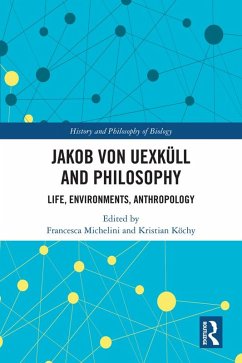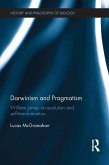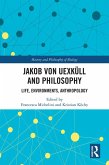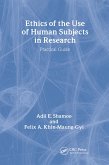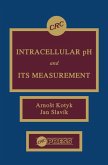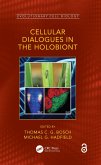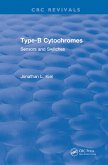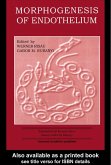Jakob von Uexküll and Philosophy (eBook, PDF)
Life, Environments, Anthropology
Redaktion: Michelini, Francesca; Köchy, Kristian
41,95 €
41,95 €
inkl. MwSt.
Sofort per Download lieferbar

21 °P sammeln
41,95 €
Als Download kaufen

41,95 €
inkl. MwSt.
Sofort per Download lieferbar

21 °P sammeln
Jetzt verschenken
Alle Infos zum eBook verschenken
41,95 €
inkl. MwSt.
Sofort per Download lieferbar
Alle Infos zum eBook verschenken

21 °P sammeln
Jakob von Uexküll and Philosophy (eBook, PDF)
Life, Environments, Anthropology
Redaktion: Michelini, Francesca; Köchy, Kristian
- Format: PDF
- Merkliste
- Auf die Merkliste
- Bewerten Bewerten
- Teilen
- Produkt teilen
- Produkterinnerung
- Produkterinnerung

Bitte loggen Sie sich zunächst in Ihr Kundenkonto ein oder registrieren Sie sich bei
bücher.de, um das eBook-Abo tolino select nutzen zu können.
Hier können Sie sich einloggen
Hier können Sie sich einloggen
Sie sind bereits eingeloggt. Klicken Sie auf 2. tolino select Abo, um fortzufahren.

Bitte loggen Sie sich zunächst in Ihr Kundenkonto ein oder registrieren Sie sich bei bücher.de, um das eBook-Abo tolino select nutzen zu können.
By collecting for the first time essays on the most relevant philosophers who have dealt with the biologist Jakob von Uexküll (1864-1944), the book generates a global picture of his previously unaccounted and yet enormous impact on philosophy of the 20th Century and on current debates.
- Geräte: PC
- ohne Kopierschutz
- eBook Hilfe
- Größe: 2.18MB
Andere Kunden interessierten sich auch für
![Darwinism and Pragmatism (eBook, PDF) Darwinism and Pragmatism (eBook, PDF)]() Lucas McGranahanDarwinism and Pragmatism (eBook, PDF)41,95 €
Lucas McGranahanDarwinism and Pragmatism (eBook, PDF)41,95 €![Jakob von Uexküll and Philosophy (eBook, ePUB) Jakob von Uexküll and Philosophy (eBook, ePUB)]() Jakob von Uexküll and Philosophy (eBook, ePUB)41,95 €
Jakob von Uexküll and Philosophy (eBook, ePUB)41,95 €![Ethics of the Use of Human Subjects in Research (eBook, PDF) Ethics of the Use of Human Subjects in Research (eBook, PDF)]() Adil ShamooEthics of the Use of Human Subjects in Research (eBook, PDF)55,95 €
Adil ShamooEthics of the Use of Human Subjects in Research (eBook, PDF)55,95 €![Intracellular pH and its Measurement (eBook, PDF) Intracellular pH and its Measurement (eBook, PDF)]() Arnost KotykIntracellular pH and its Measurement (eBook, PDF)414,95 €
Arnost KotykIntracellular pH and its Measurement (eBook, PDF)414,95 €![Cellular Dialogues in the Holobiont (eBook, PDF) Cellular Dialogues in the Holobiont (eBook, PDF)]() Cellular Dialogues in the Holobiont (eBook, PDF)0,99 €
Cellular Dialogues in the Holobiont (eBook, PDF)0,99 €![Type-B Cytochromes: Sensors and Switches (eBook, PDF) Type-B Cytochromes: Sensors and Switches (eBook, PDF)]() J. L. KielType-B Cytochromes: Sensors and Switches (eBook, PDF)51,95 €
J. L. KielType-B Cytochromes: Sensors and Switches (eBook, PDF)51,95 €![Morphogenesis of Endothelium (eBook, PDF) Morphogenesis of Endothelium (eBook, PDF)]() Werner RisauMorphogenesis of Endothelium (eBook, PDF)212,95 €
Werner RisauMorphogenesis of Endothelium (eBook, PDF)212,95 €-
-
-
By collecting for the first time essays on the most relevant philosophers who have dealt with the biologist Jakob von Uexküll (1864-1944), the book generates a global picture of his previously unaccounted and yet enormous impact on philosophy of the 20th Century and on current debates.
Dieser Download kann aus rechtlichen Gründen nur mit Rechnungsadresse in A, B, BG, CY, CZ, D, DK, EW, E, FIN, F, GR, HR, H, IRL, I, LT, L, LR, M, NL, PL, P, R, S, SLO, SK ausgeliefert werden.
Produktdetails
- Produktdetails
- Verlag: Taylor & Francis
- Seitenzahl: 282
- Erscheinungstermin: 9. Dezember 2019
- Englisch
- ISBN-13: 9781000765786
- Artikelnr.: 58388643
- Verlag: Taylor & Francis
- Seitenzahl: 282
- Erscheinungstermin: 9. Dezember 2019
- Englisch
- ISBN-13: 9781000765786
- Artikelnr.: 58388643
- Herstellerkennzeichnung Die Herstellerinformationen sind derzeit nicht verfügbar.
Francesca Michelini is Senior Research Fellow at the University of Kassel (Germany). Her main fields of research are the antireductionist theories of life and the bridging of continental philosophy and science. She is author of many publications on the topic of philosophical anthropology, philosophy of the life sciences, teleological explanations in nature, and autonomy in biology (among others: The Living and the Deficiency. Essays on Teleology 2011, in Italian). Kristian Köchy is a biologist and Professor of Theoretical Philosophy at the University of Kassel (Germany). His research focuses on the areas of philosophy of science and the history of the life sciences, natural philosophy and the philosophy of animal-human relations. He is author of an introduction on Biophilosophy (2008, in German) and co-editor of a three-volume collection on the philosophy of animal research (Philosophie der Tierforschung, 2016-2018).
Introduction. A Foray into Jakob von Uexküll's Heritage; PART 1. Jakob von
Uexküll and His Historical Background; 1. Jakob von Uexküll, an
Intellectual History; 2. Kantian Ticks, Uexküllian Melodies and the
Transformation of Transcendental Philosophy; 3. Uexküll's Legacy:
Biological Reception and Biophilosophical Impact; PART 2. Jakob von
Uexküll's Relevance for Philosophy; 4. Creative Life and the Ressentiment
of Homo Faber. How Max Scheler integrates Uexküll's Theory of Environment;
5. Closed Environment and Open World: On the Significance of Uexküll's
Biology for Helmuth Plessner's Natural Philosophy; 6. Ernst Cassirer's
Reading of Jakob von Uexküll: Between Natural Teleology and Anthropology;
7. The Philosopher's Boredom and the Lizard's Sun. Martin Heidegger's
Interpretation of Jakob von Uexküll's Umwelt Theory; 8. Animal Behavior and
the Passage to Culture: Merleau-Ponty's Remarks on Uexküll; 9. The Organism
and its Umwelt: A Counterpoint between the Theories of Uexküll, Goldstein
and Canguilhem; 10. From Ontology to Ethology: Uexküll and Deleuze &
Guattari; 11. Hans Blumenberg: The Transformation of Uexküll's
Bioepistemology into Phenomenology; 12. Giorgio Agamben: The Political
Meaning of Uexküll's "Sleeping Tick"; 13. Jakob von Uexküll and the Study
of Primary Meaning-Making; 14. Jakob von Uexküll's Theory of Umwelt
Revisited in the Wake of the Third Culture: Staging Reciprocity and
Cooperation between Artistic Agents; Afterword. A Future for Jakob von
Uexküll.
Uexküll and His Historical Background; 1. Jakob von Uexküll, an
Intellectual History; 2. Kantian Ticks, Uexküllian Melodies and the
Transformation of Transcendental Philosophy; 3. Uexküll's Legacy:
Biological Reception and Biophilosophical Impact; PART 2. Jakob von
Uexküll's Relevance for Philosophy; 4. Creative Life and the Ressentiment
of Homo Faber. How Max Scheler integrates Uexküll's Theory of Environment;
5. Closed Environment and Open World: On the Significance of Uexküll's
Biology for Helmuth Plessner's Natural Philosophy; 6. Ernst Cassirer's
Reading of Jakob von Uexküll: Between Natural Teleology and Anthropology;
7. The Philosopher's Boredom and the Lizard's Sun. Martin Heidegger's
Interpretation of Jakob von Uexküll's Umwelt Theory; 8. Animal Behavior and
the Passage to Culture: Merleau-Ponty's Remarks on Uexküll; 9. The Organism
and its Umwelt: A Counterpoint between the Theories of Uexküll, Goldstein
and Canguilhem; 10. From Ontology to Ethology: Uexküll and Deleuze &
Guattari; 11. Hans Blumenberg: The Transformation of Uexküll's
Bioepistemology into Phenomenology; 12. Giorgio Agamben: The Political
Meaning of Uexküll's "Sleeping Tick"; 13. Jakob von Uexküll and the Study
of Primary Meaning-Making; 14. Jakob von Uexküll's Theory of Umwelt
Revisited in the Wake of the Third Culture: Staging Reciprocity and
Cooperation between Artistic Agents; Afterword. A Future for Jakob von
Uexküll.
Introduction. A Foray into Jakob von Uexküll's Heritage; PART 1. Jakob von
Uexküll and His Historical Background; 1. Jakob von Uexküll, an
Intellectual History; 2. Kantian Ticks, Uexküllian Melodies and the
Transformation of Transcendental Philosophy; 3. Uexküll's Legacy:
Biological Reception and Biophilosophical Impact; PART 2. Jakob von
Uexküll's Relevance for Philosophy; 4. Creative Life and the Ressentiment
of Homo Faber. How Max Scheler integrates Uexküll's Theory of Environment;
5. Closed Environment and Open World: On the Significance of Uexküll's
Biology for Helmuth Plessner's Natural Philosophy; 6. Ernst Cassirer's
Reading of Jakob von Uexküll: Between Natural Teleology and Anthropology;
7. The Philosopher's Boredom and the Lizard's Sun. Martin Heidegger's
Interpretation of Jakob von Uexküll's Umwelt Theory; 8. Animal Behavior and
the Passage to Culture: Merleau-Ponty's Remarks on Uexküll; 9. The Organism
and its Umwelt: A Counterpoint between the Theories of Uexküll, Goldstein
and Canguilhem; 10. From Ontology to Ethology: Uexküll and Deleuze &
Guattari; 11. Hans Blumenberg: The Transformation of Uexküll's
Bioepistemology into Phenomenology; 12. Giorgio Agamben: The Political
Meaning of Uexküll's "Sleeping Tick"; 13. Jakob von Uexküll and the Study
of Primary Meaning-Making; 14. Jakob von Uexküll's Theory of Umwelt
Revisited in the Wake of the Third Culture: Staging Reciprocity and
Cooperation between Artistic Agents; Afterword. A Future for Jakob von
Uexküll.
Uexküll and His Historical Background; 1. Jakob von Uexküll, an
Intellectual History; 2. Kantian Ticks, Uexküllian Melodies and the
Transformation of Transcendental Philosophy; 3. Uexküll's Legacy:
Biological Reception and Biophilosophical Impact; PART 2. Jakob von
Uexküll's Relevance for Philosophy; 4. Creative Life and the Ressentiment
of Homo Faber. How Max Scheler integrates Uexküll's Theory of Environment;
5. Closed Environment and Open World: On the Significance of Uexküll's
Biology for Helmuth Plessner's Natural Philosophy; 6. Ernst Cassirer's
Reading of Jakob von Uexküll: Between Natural Teleology and Anthropology;
7. The Philosopher's Boredom and the Lizard's Sun. Martin Heidegger's
Interpretation of Jakob von Uexküll's Umwelt Theory; 8. Animal Behavior and
the Passage to Culture: Merleau-Ponty's Remarks on Uexküll; 9. The Organism
and its Umwelt: A Counterpoint between the Theories of Uexküll, Goldstein
and Canguilhem; 10. From Ontology to Ethology: Uexküll and Deleuze &
Guattari; 11. Hans Blumenberg: The Transformation of Uexküll's
Bioepistemology into Phenomenology; 12. Giorgio Agamben: The Political
Meaning of Uexküll's "Sleeping Tick"; 13. Jakob von Uexküll and the Study
of Primary Meaning-Making; 14. Jakob von Uexküll's Theory of Umwelt
Revisited in the Wake of the Third Culture: Staging Reciprocity and
Cooperation between Artistic Agents; Afterword. A Future for Jakob von
Uexküll.
